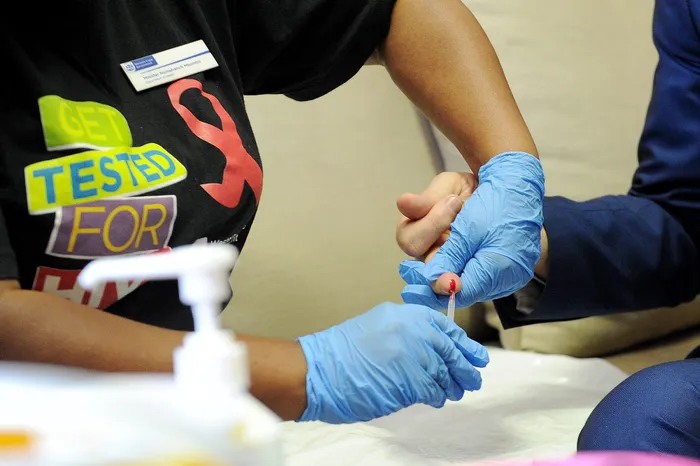The parallels and contrasts of fighting the Aids pandemic and Covid-19 pandemic

A health care worker conducts an HIV test. Picture: David Ritchie/African News Agency(ANA)
While the world is preoccupied with battling the Coronavirus (Covid-19) pandemic, it is easy to forget other pandemics such as HIV and Aids that equally plague the planet with even more devastating consequences.
As the world ponders the theme of “Global solidarity, shared responsibility”, for the 2020 observance of World Aids Day on December 1, one is prompted to ask: Are there some bleak parallels in the Covid-19 pandemic now wracking the world and the Aids pandemic? Yes. The answer can be found in the same theme.
The statistics of the Coronavirus pandemic are dire with more than 60 million confirmed cases in 190 countries and more than 1.4m deaths.
In contrast, more than 75m people globally became infected with HIV in the period between its discovery in the 1980s, with the loss of a staggering 32m lives. More than 38m around the world are living with HIV.
HIV/Aids/Covid-19 and personal responsibility
Indeed, the infection for both HIV/Aids and Covid-19 has been studied extensively, and it means the methods of transmission and everyone’s responsibilities are well-known. We know the greater part of the problem appears to be complacency coupled with a lack of personal responsibility.
For example, the primary cause of HIV/Aids infection begins with one party being sexually promiscuous. This calls for more responsibility and vigilance on how we conduct our lives.
Like HIV/Aids, to prevent the spread of Covid-19, it is incredibly important we take personal responsibility for our actions and understand how those actions can impact others.
This means prevention begins at home, where South Africans have the power – and the responsibility – to prevent additional contagion and infections.
For Covid-19, we know how to save lives. Part of the responsibility is to wear a mask when physical distancing is not possible, not to touch our eyes, nose or mouth and cover our nose and mouth with a bent elbow or a tissue when coughing or sneezing. We should also clean our hands often, use soap and water or an alcohol-based sanitiser and stay home when we feel unwell. If we have a fever, cough and difficulty breathing, we should seek medical attention.
It is possible to achieve this by listening to people’s fears, perceptions and beliefs about HIV, Aids and Covid-19 and tailoring social mobilisation activities to address these fears.
I have found these tips for people living with HIV in this Covid-19 era very useful:
• Help your immune system fight off infection by staying healthy.
• Get plenty of rest and reduce stress.
• Practice Covid-19 health protocols such as wearing masks and social distancing.
• Have at least a 30-day supply of your HIV medicine and any other medications or medical supplies you need to manage HIV.
• Establish a plan for clinical care with your health care provider.
• Maintain social connections remotely, such as online, by phone or video chat.
Political will, leadership, HIV/AIDS and Covid-19
Covid-19 has shown how political will and committed leadership can bring about change. We have seen governments urgently coming up with policy measures and financial resources to save lives, protect livelihoods and jobs.
Just as the 2020 World Aids Day theme calls for “Global solidarity, shared responsibility”, as we enter the last decade of action to end Aids as a public health threat by 2030, we need the same political will, worldwide collaboration and commitment used to respond to Covid-19 to tackle the Aids pandemic.
The colliding Covid-19 pandemic and HIV/Aids pandemic are a wake-up call and an opportunity to do things differently – better, and together. It can be done!
*Mokgokong is chairperson of AfroCentric Health Group, owners of Medscheme and other health care providers, and Executive Chairperson of Community Investment Holdings.
16 Days of Activism: Local NGO wants to empower young girls to make informed decisions
Nurses are playing bigger role than ever in fight against HIV and that’s why they deserve more support
From the president’s desk: SA needs to intensify fight against HIV/Aids
World Aids Day 2020: reimagining a resilient response for children, adolescents and pregnant women living with HIV
Related Topics: